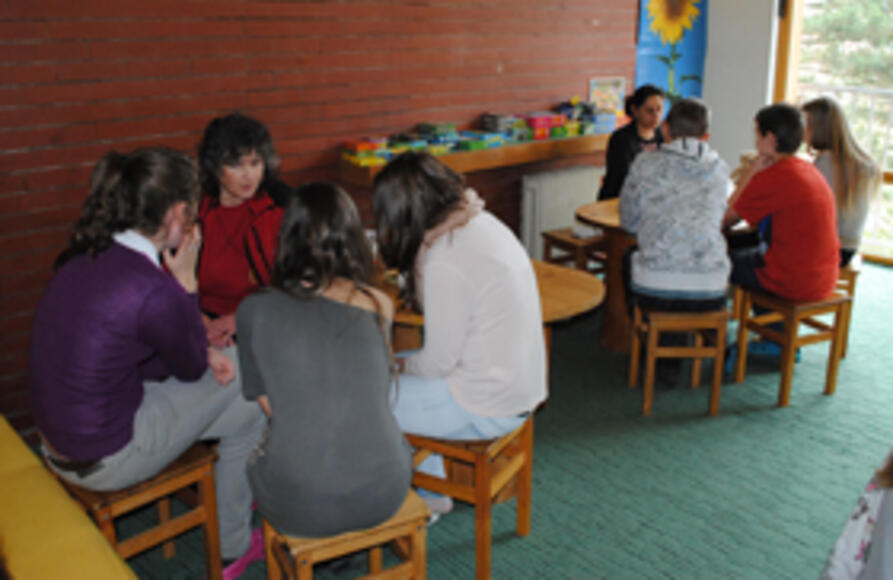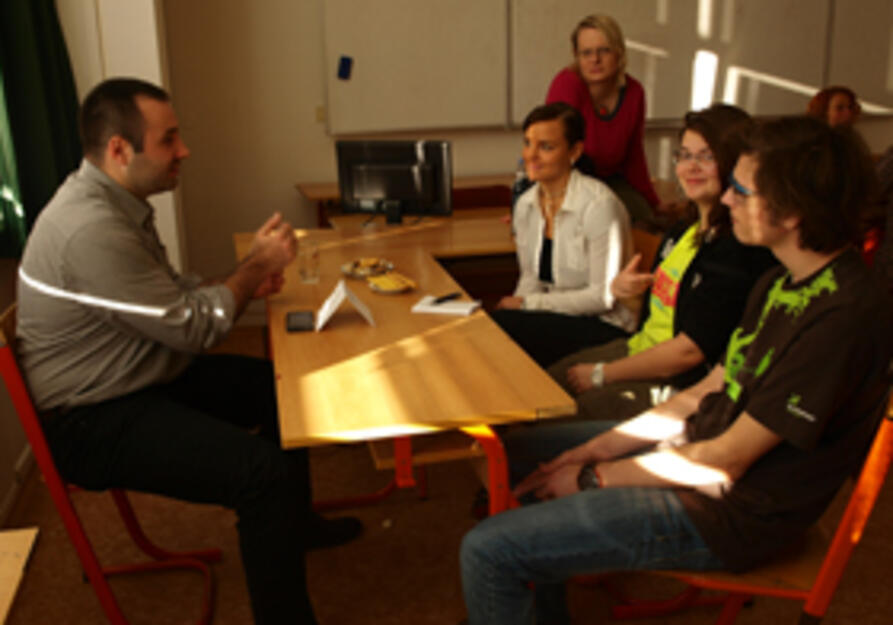
Books that speak for themselves: Czech Success with Human Library
Living books in a Human Library are the main attraction in a new project that aims to prevent discrimination, racism and extremism.
Publisert:
24. Jan 2014, kl. 13:37
|
Sist oppdatert:
10. nov 2017, kl. 09:23
In the Human Library, rather than borrowing books, students can “borrow” a person with an interesting life story, whom they otherwise might never have met in real life. They may ask the person anything they would like to know. The people, who the students are able to meet, are members of various minority groups living in the Czech Republic.
The project, called Fair Play – Students for Equality, is initiated by the Human Rights Education section of Amnesty International Czech Republic and funded by AI Norway through money from the 2012 Telethon fundraising event.
A live library
- The Human Library helps students overcome the fear of the unknown and reject common stereotypes. It gives them the opportunity to gain experience, too. This project is a unique chance for the ‘books’ as well, since they take part in forming the students' relationship with minorities and share their personal experience with young people, says Jiří Bejček, the Coordinator of AI Czech Republic's Human Rights Education department.
Students may borrow each human book for about 20 minutes. The “book” answers their questions or initiates the discussion if needed. Students form small groups, so they have space for personal contact, and do not have to be afraid of discussing and asking questions in front of the whole class.
The Human Library is part of the educational cycle where students do not only learn about discrimination and xenophobia, but they are also encouraged to take action and promote human rights in the second part of the project.
Aims to inform, stimulate and support
In 2013, AI Czech Republic set up a long-term cooperation with twelve primary and secondary schools and drop-in clubs in Prague, Brno, and Ústí nad Labem. Through the Fair Play – Students for Equality Project, many educational human rights activities will be realized here. Amnesty wants not only to inform young people about discrimination, racism and extremism, but also to stimulate students' activity and support them in taking action to protect human rights. By doing so, Amnesty is responding to the increasing racial intolerance in the Czech society.
Interactive workshops that presented the problems to students were held in all of the schools in October and November 2013. Young people learned to recognize racist and xenophobic attitudes, whilst being introduced to the principles and structures of prejudices and stereotypes, and also to their impact on other people. The main activity of the project is the Human Library, which has been set up at five schools so far.
A great success
In November 2013, the first Human Library was held and achieved great success:
- I thought they would learn something from me... but, as it turned out, I actually learnt a lot about myself from them, says Jan Dužda, a Romani studies student, about his first experience as a “human book”.
Several 8th year students shared a new experience:
- The interviews with books were interesting. I guess I wouldn't believe such stories in films... To my schoolmates, I would say they are lucky they could have slept longer, but I think they made a mistake! one of the pupils summed up his feelings.
- For everyone, it was a new enjoyable experience. Curiosity overcame initial shyness, a friendly atmosphere was created, and everything, I suppose, went very well. We are looking forward to the next schools and new experiences, says Šárka Antošová, the AI's Human Rights Education Methodologist.
The living book collection is really varied – from an Angolan student to an Afghan refugee, to a blind sculptor.
Diversity in living literature
The living book collection is really varied – from an Angolan student to an Afghan refugee, to a blind sculptor.
One example is Daniel Rampáček. Dan has been in a wheelchair since childhood, and yet he proves every day that wheelchair users are no arbitrarily controllable objects. This is also why he – as one of the first wheelchair users – went to a standard primary school and then to a secondary school, too. Now, he studies psychology and theatre studies in Brno. Being an active citizen, Daniel also runs a club that organizes events to support Roma people, he is a competitive swimmer, plays theatre and works with children.
INTERESTING PEOPLE IN THE HUMAN LIBRARY
Margita Rácová (Czech Republic) – Margita is a social worker with Roma origins. She works with socially excluded families in Brno. In her free time she works as a volunteer with kids and their parents. She has a daughter and likes to paint. Margita is active in public live and one of the topics which she finds interesting is inclusive education.
Leonard Teca (Angola) – Leonard's father was a Baptist preacher in Angola pursued by the regime, and because of that, Leonard was forced to leave his family and go study abroad. He ended up in Czechoslovakia. He finished a secondary engineering school and decided to study theology. He is now a pastor of the Evangelical Church of Czech Brethren in Rokycany. Since he left the country, Leonard has visited Angola only once, and in secrecy with somebody else's passport. “I was born in the wrong place, at the wrong time, but I'm proud of it” is the motto of Leonard's life.
Fatema Rahimi (Afghanistan) – After Taliban has risen to power, Fatema's father, a Persian literature teacher, started having trouble and decided to run away abroad with his family. The 4700-kilometre-long journey to the Czech Republic took seven months. Fatema and her family spent two years travelling from one Czech refugee camp to another. Eventually, she found her new home in Šumperk. This is where she successfully finished secondary school. She now studies European cultural history at the Charles University. However, her favourite hobby is football and she can talk about it for hours.
Nguyen Thuong Ly (Vietnam) – Both of her parents come from Vietnam, but they did not meet until they both studied in Czechoslovakia. Therefore Ly belongs to the first generation of Vietnamese children born in the Czech Republic – sometimes referred to as “the banana children” because they are “yellow” on the outside and “white” on the inside, just like bananas. Being considered a foreigner in the Czech Republic and Vietnam alike, she is nowhere at home. Besides, because of her father's political activities, Ly and her family could not go to the country they come from – and where a big part of the family still lives – for a long time. Ly studies journalism at the Faculty of Social Sciences (Charles University). She was an editor in the AI Czech Republic's exisTENSE magazine for a year, and she likes books and photography.


